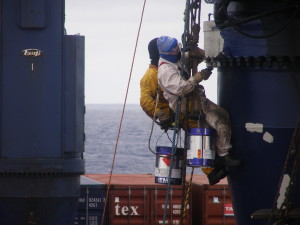We need to tune in to all our senses when we’re writing so that readers can feel the full experience we’re trying to describe. In writing about a container ship in Letters from the Pacific, I was able to use most of them.
In over a month, there has only been one occasion when we had the wind at our back doing more knots than the ship. The Captain assures me this happens only rarely. It creates a vacuum in front of the superstructure that sucks engine fumes right into the air-conditioning intake, and this makes your cabin smell like the inside of a gasoline pump. I awoke to this one night and lay awake for quite a while wondering whether I should call somebody to tell them the ship would explode if anybody lighted a cigarette. I opened my porthole to let in some fresh air but, since my cabin faces forward, the air outside smelled the same as the air inside. Eventually I assumed that, if there really had been a problem, somebody would have sounded the alarm, and I went back to sleep.
* * *
It takes a while not to be alarmed by the smells on board. There are places where you can smell the heavy, oily fumes of diesel; whenever anyone is painting – a constant battle at sea against the ever recurring rust – the chemical smell of the anti-corrosive paint permeates the superstructure; and just outside my cabin, at the head of the stairwell, I get occasional puffs of bottled gas wafting up from the Galley just like smoke up a chimney. A freighter is a noisy, dirty, smelly beast. I wonder how they hide all this on passenger ships.
* * *
There is the sweet smell of salt on the air. And, with the moon not yet risen, there is a foreign country of constellations in the sky.
* * *
You can smell the tropics. Out on deck in the dark, the stars faintly winking on and off as low clouds stream invisibly across the sky, there’s a new, heavy warmth to the air. I feel it on my skin, taste it in my nose; it’s humid, soft and kind.
© 2013, Sandra Shaw Homer

